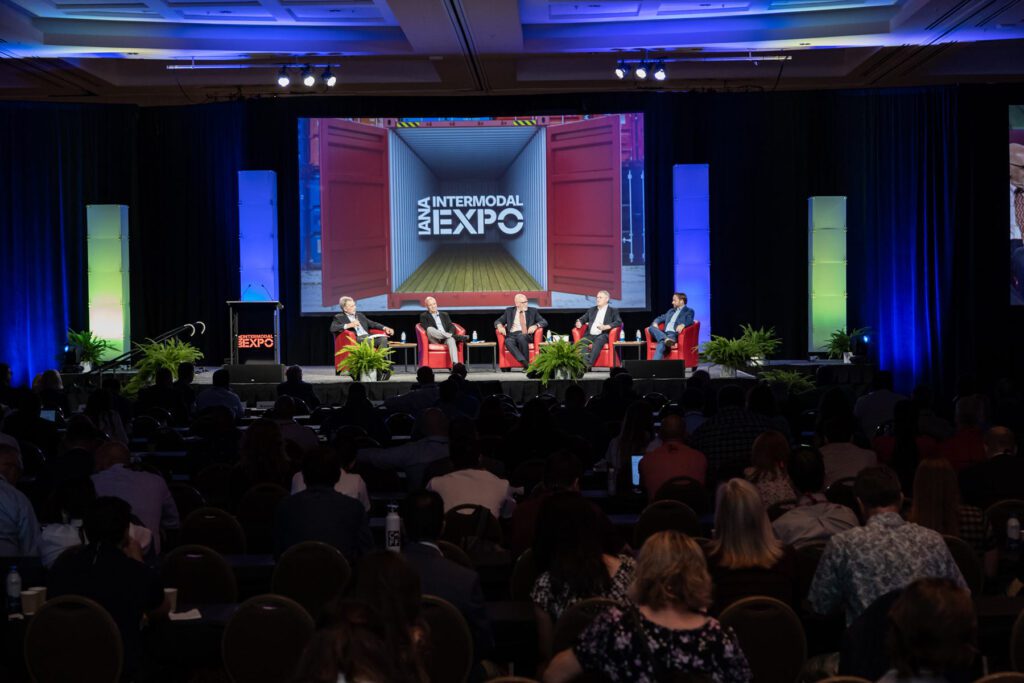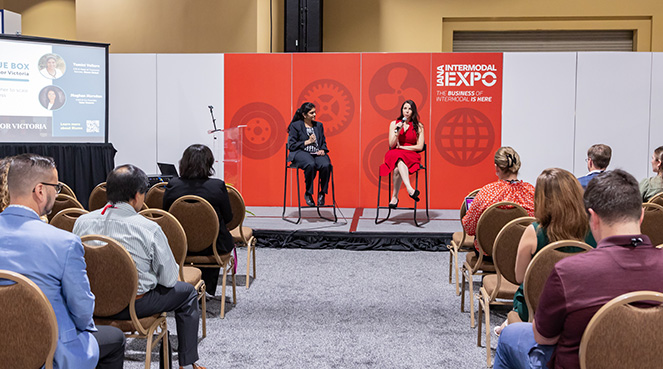
From Sept. 12-14, the Intermodal Association of North America (IANA) welcomed more than 2,000 members of the goods transport industry to Long Beach, California for the organization’s annual Intermodal Expo, which was chock full of information, analysis and insight across its three days.
Many of the event’s IANA-organized sessions focused on ongoing supply chain challenges and opportunities within the industry. Representatives from more than 110 companies were in attendance, according to IANA.
The expo’s first general session, “Inside Intermodal,” which was led by John Larkin of Clarendon Capital, offered thoughts and insights on intermodal’s direction from the perspectives of 3PLs, motor carriers, rail and marine.
The session’s experts panelists were Evan Armstrong, president of supply chain management company Armstrong & Associates; Larry Gross, president and founder of Gross Transportation Consulting; Vespucci Maritime CEO Lars Jensen; and Tim Denoyer, vice president and senior analyst with ACT Research.
Each weighed in on the recent past and predictions on the near future of the goods movement industry, including a 10% drop in year-to-date inland container moves in North America so far during 2022.
“Earlier in the year and late last year, ocean carriers were short of containers in Asia, so there was a huge push to get the equipment back as fast as possible and rates were astronomical,” Gross explained. “When we got to March, that situation eased up, and they turned the switch back on, but we’re working through it.”
Gross also said that he doesn’t have high expectations for movement volumes for the remainder of the year since a lot of freight that’s typically moved during the peak shipping season before the holidays moved early.
“Peak won’t be very peak,” he remarked. “It will be more like a plateau than a peak.”
Jensen, who noted that there’s currently an overcapacity situation in the container market, said he expects ocean container shipping rates to continue to decline this year, but predicted that they will eventually end up above the levels of 2019, the last pre-pandemic year.
“A lot of new players came into the market in the last two years with small vessels and high charter rates. Some of these will trigger a price war that will drive rates down,” he commented.

AB5 Discussion
The second general session, “What’s Next for the Independent Contractor Model in California?,” delved into the impact of AB5 legislation in California and its potential ramifications across the country. The moderator was Marc Blubaugh of Benesch, Friedlander, Coplan & Aronoff.
AB5 is a California statute extends employee classification status to some so-called gig workers, such as drayage truck drivers and warehouse laborers. Under the legislation, which was passed in 2019, but hadn’t been enforced until recently, companies are required to use a three-pronged assessment—known as the ABC test—to demonstrate that workers are independent contractors, not employees.
Under the ABC test, a worker is considered to be an employee unless all of the following are true: the worker is free from the control and direction of the hiring organization in connection with the performance of the work; the worker performs work that is outside the hiring entity’s business; and the is routinely does work in an independently established trade, occupation, or business that is the same as the work being requested and performed.
Under AB5, business capacity owners are no longer be permitted to enter into lease agreements with motor carriers for the exclusive right to their services and the use of their equipment.
Enforcement of the legislation began in late August.
During the session on the topic, Marc Blubaugh, a partner at transportation and logistics group Benesch, Friedlander, Coplan & Aronoff led a discussion regarding how AB5 affects the independent contractor business model in California.
Harbor Trucking Association CEO Matt Schrap said he expects to see claims against motor carriers by attorneys and/or government entities.
He also said many drivers have made it clear they don’t want to be employees.
“If they want to be employees, there are thousands of jobs they could take advantage of,” he remarked. “We have owner-operators making $5,000 a week or more. To give that up to go make $30 an hour is a hard pill to swallow.”
The push to zero-emission vehicles in 2024 creates even more challenges for owner-operators, another panelist, California Trucking Association Senior Vice President of Government Affairs Chris Shimoda, remarked.
“If you drew up a map of how to completely obliterate California’s supply chain, it would probably look like what they’re doing right now,” he commented. “We need to push back with as many people who will listen.”
Chassis Issues
The event’s final general session, titled “Intermodal Chassis Provisioning—Where are We Now and What’s Next?,” addressed recent shortages of key intermodal equipment in The conversation featured C-suite decision-makers and senior executives, including moderator Bill Hamlin of Gray Wolf Group LLC.
The overall U.S. chassis fleet is roughly 700,000 units in decline, according to ACT’s Denoyer.
“That population had been shrinking since 2019, and last year production was impacted by the tariffs,” Denoyer said. “We think replacement demand is probably 25,000-30,000 new chassis per year.”
He estimated the chassis industry is building 60,000 units this year, up from 25,000 in 2021, and noted new entities are entering the market.
“We are going from a shortage to a better supply,” he remarked. “We think replacement demand is probably 25,000-30,000 new chassis per year.”
Awards Ceremony
The expo also included the presentation of IANA’s three industry awards: the Silver Kingpin Award, the Chairman’s Award and the Intermodal Achievement Award.
Rep. Alan Lowenthal of California’s 47th District was the recipient of IANA’s Intermodal Achievement Award.
Lowenthal, who previously announced that he’s retiring at the end of his current term, was lauded for his public service work in championing the supply chain by creating and/or pushing legislation that furthered those efforts, including his work in passing the Infrastructure Investment and Jobs Act of 2021.
Ted Prince, chief strategy officer and co-founder of Tiger Cool Express received the Silver Kingpin Award and Jim Newsome, executive advisor to the South Carolina Ports Authority, was presented with the 2022 Chairman’s Award.
They were recognized at the expo’s opening general session on Sept. 13.
“On behalf of the board, I commend these three individuals for what they have brought to the intermodal industry over many decades,” IANA chairman and deputy executive director of the Port of Long Beach Noel Hacegaba said. “The impact of their contributions will be felt by intermodal stakeholders as well as the general public well beyond their respective careers.”
The 2023 Intermodal Expo is currently scheduled to be held in Long Beach from Sept. 11-13.
